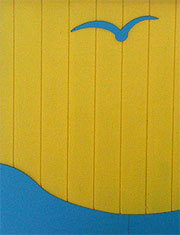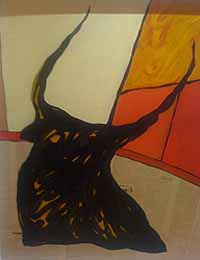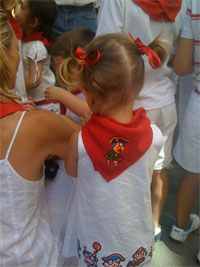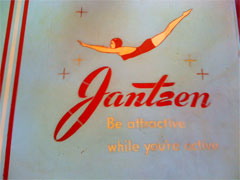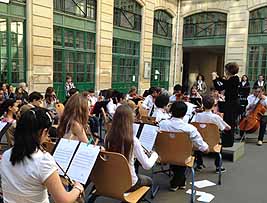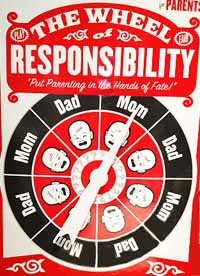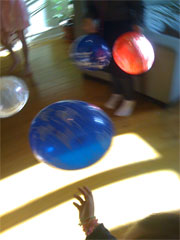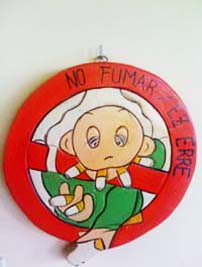Pack for Later
Each room gets worse before it gets better. Moving is not an orderly activity. One does not simply open a cardboard box, reinforce it with masking tape and begin pulling objects from shelves and drawers, calmly placing them in the carton. Maybe one does, a professional mover, or someone who doesn’t keep mementos, someone dutiful to the touch every piece of paper once rule. That one is not me. So many pieces of my life are squirreled away in the recesses of my closets and drawers; each time I open one to empty it out, I am arrested by memories.
That’s how the mess starts. In the back of my closet, I find two delicate gray silk bags, like large envelopes – once used, I think, for keeping lingerie or something. It’s not clear, their purpose. They belonged to my grandmother. I’ve never used them. I do not want to discard them, but I won’t need them immediately. Where to put them? I carry the two silk sacks around the apartment, thinking about where they might be stored, finally creating a purgatory pile for those objects that will not be taken to the garbage or the recycling bin, but nonetheless are not necessities for the next few months, the pack for later pile.
Emptying the bathroom cupboards, I realize a shoe box would be useful for storing such purgatorial items. In our office, under the shelves behind the guest bed, I keep a stash of boxes, just like my mother kept boxes of every size in her backroom, so we were never in need when we wanted to wrap a present. To get to this stash I must move the bed. In the process, I find a wooden crate filled with all the love letters De-facto and I exchanged in our three-year long-distance relationship before he moved to Paris. I can’t resist the urge to peek inside. The letters and cards, compressed in the box for years, fall out onto the bed, a cascade of my own tiny handwriting and his chicken scribble, all our early love packed into folded pages. Like magnets, they pull me into the mood of those heady, hopeful days, when the mail was a main link between us. I reel myself back from this dangerous chute of nostalgia, folding the letter I started to open and pressing the box to close and clamp it shut.
Behind it, another box filled with the Short-pants and Buddy-roo‘s school papers. Their primary notebooks are easier to toss, though I am compelled to skim through them, just to review the work they have done, to see the evolution of their penmanship, the precision of the French teaching methodology. I flip through each one before putting it in the recycling pile. The notebooks from maternelle (ages three to five) are harder to part with. The French pre-school is brilliant; the combination of art and learning cleverly intertwined. Oversized notebooks with pages of drawings and paintings and crafted activities, evidence of the girls first efforts at expressing themselves, too precious to part with yet. As I push that box aside, I find another one stuffed with clothes I’d forgotten about. Of course these must be laid on the bed and sorted, and actually, that sweater will fit Buddy-roo, so I take it upstairs and…
Three hours later I return to the bathroom with a shoebox. But now every room on the apartment has a cupboard or a drawer thrown open, its contents spilled onto the floor in three piles: throw away, pack for now, or pack for later.
~ ~ ~
We’ve been restless for several years. In 2008, De-facto did a reconnaissance trip to Buenos Aires, to see if it would make sense for us to move there. He came back mildly enthusiastic, but then work picked up and other things happened and we let that idea slip away. We are not unhappy in Paris. Our life is convenient and convivial. The school is close. Our friends, many of  them parents at the same school, are the right mix of worldly but down-to-earth. We live in the heart of the city and my favorite restaurants, bars and shops are all footsteps away. There is nothing wrong with our life here.
them parents at the same school, are the right mix of worldly but down-to-earth. We live in the heart of the city and my favorite restaurants, bars and shops are all footsteps away. There is nothing wrong with our life here.
Why would we leave, then? Because we can. We are not tethered to any particular geographical coordinates for our work. De-facto and I both travel away from Paris to exercise our profession, and any preparation for our assignments happens via email and virtual meetings. As much as we love Paris, we love to explore other places and we know the difference between traveling as a tourist and immersing yourself in another culture for an extended stay. We want the girls to acquire more languages, and not to be too rooted in one culture.
Mostly, though, we’re doing it because we need to change. We need to mix it up, put ourselves in a situation where we have to start anew. It will keep our brains from shrinking. Somebody asked us about leaving and De-facto and I responded almost simultaneously, “so we don’t get old.” Taking a risk and trying something new, forcing old patterns to break and new ones to form, this seems to us a reasonable antidote to getting grumpy and stodgy and fixed in our ways.
Paris, if you love her, is a hard city to leave. So maybe it’s not for good. Maybe it’s just a year to have an experience elsewhere. This is what we’ve told the school, so that the girls could be re-enrolled. This is what we’ve told our friends as they stare back at us, mystified. This is what we’ve told ourselves, to keep from being overwhelmed by the decision and its ensuing torrent of tasks and emotions: maybe it’s just a sabbatical from our beloved Paris.
~ ~ ~
The school was the linchpin. During our visit to Barcelona last March we visited the Lycée Francais and met with the headmistress. The girls eyes widened with every step at the large, well-equipped classrooms, the tennis courts, a climbing wall. Short-pants was ecstatic about the size and mood of the library. Buddy-roo’s class year was over-inscribed and her enrollment was not guaranteed, so we applied with our fingers crossed. Word came only at the very end of June that both girls had been accepted. As long as we knew they could have an easy transition – courses will be primarily in French, just like their old school, but they’ll also have classes in English, Spanish and Catalán – we had the green light to move to Barcelona.

The obvious next step: rent an apartment. De-facto and I went there in July, pounding the pavement around the school and further afield. We returned with several intriguing options, none of which have panned out. I wanted to go back and look again, and now that we have the lay of the land, our online apartment hunting has yielded a dozen more options. But Barcelona, like Paris, shuts down for the end of August. I couldn’t schedule enough appointments to make it worth the expensive trip. So we will arrive in Barcelona, just about a week from now, without a place to live.
That’s not the hardest part. A friend has loaned us her place for a week, and there are dozens of Air BnB apartments to rent for short term stays. What’s harder is the not knowing. Not knowing if we need furniture or not. Not knowing how long we might be in temporary digs. Not knowing what has to come now, what can come later. Moving is a tumultuous experience even if you can picture the next stop. The abstract quality of our destination is my greatest challenge.
~ ~ ~
There is a frenzy of things to do. Papers to put in order, closets to empty, boxes to pack, doctors appointments to get out of the way in order to arrive with a clean bill of health and a few months to find new practitioners. I take advantage of the familiar conveniences while I can: refilling prescriptions at my pharmacy, getting my watch repaired at the shop around the corner. Friends want to see us before we go for a last lunch or dinner, a goodbye drink, a final nightcap. From the moment I rise each day until I collapse in bed near midnight, I am occupied with the preparations for our departure.
Add to that a grand list of tasks to prepare for our arrival in Barcelona. Searching for additional apartments, touching base with agents and organizing visits for when we arrive, contacting a “fixer” who will help us set up bank accounts, phone and internet service once we finally have an  address. Checking the website of the new school to see about starting time for new classes and what books and supplies we must purchase.
address. Checking the website of the new school to see about starting time for new classes and what books and supplies we must purchase.
There was an agility exercise we used have to do in elementary school – for the Presidential Physical Fitness test – in which you had to jump from side to side, crossing lines of masking tape laid out in intervals on the gym floor. I feel like I’m stuck in that exercise right now, stepping sideways, back and forth, cleaning here, calling there, sorting here, packing there, testing my dexterity as I transition between our current home to the next.
At some point the frenzy is too much, the packing and the sorting and the errands, the emotional weight of the goodbyes and and good luck meet-ups with local friends. I survey the mess around me, wondering how I’ll ever get it all done. This is the kind of moment when I raise my eyes to the sky at the most organized woman I ever knew, and under my breath I ask my mother, what do I do?
I close my eyes to contain the tears – she never liked criers – but I can’t hold them. Tears of sadness about leaving. Tears of exhaustion from the full-on press of activity. Tears of release. And then I hear her voice, loud and clear, in my mind, or my imagination, wherever her voice resides.
“Try ironing.”
On a dining chair, a pile of clothes is mounting. Our Wednesday child-care helper used to do the ironing for me, but we let him go because we were gone most of the summer and now we’re leaving. I told myself if I had time, maybe I’d get to it. In this messy moment, cardboard and plastic strewn about the apartment, everything up in the air: no place to live and no idea how it’ll all get sorted, I pull out the ironing board, wrench it apart, plug in the iron and wait for it to steam to life. The clothes are from the winter stash, they’d gotten too musty to pack without washing them first. I take each item, a favorite dress of Short-pants, Buddy-roo’s layered skirt, De-facto’s plaid shirts – and one by one, I iron them. I dig into the drawers for 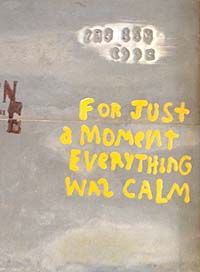 dishtowels and pillowcases, and I iron them. I breath deeply in tandem with the iron as it releases its steam each time I set it upright. Then I press it down again, ironing back and forth to smooth out the wrinkles.
dishtowels and pillowcases, and I iron them. I breath deeply in tandem with the iron as it releases its steam each time I set it upright. Then I press it down again, ironing back and forth to smooth out the wrinkles.
At the end, a pile of pressed items rests on the arm of the couch. I feel calmer. I’ve managed to draw some small measure of order out of the chaos, taken hold of the mess around me and found one small corner of things I could iron out, a stack of laundry I can be proud of, just before I put it in the pile to pack for later.
.
(Photo credit: The artwork, For just a moment, everything was calm, by Dan Walker.)







